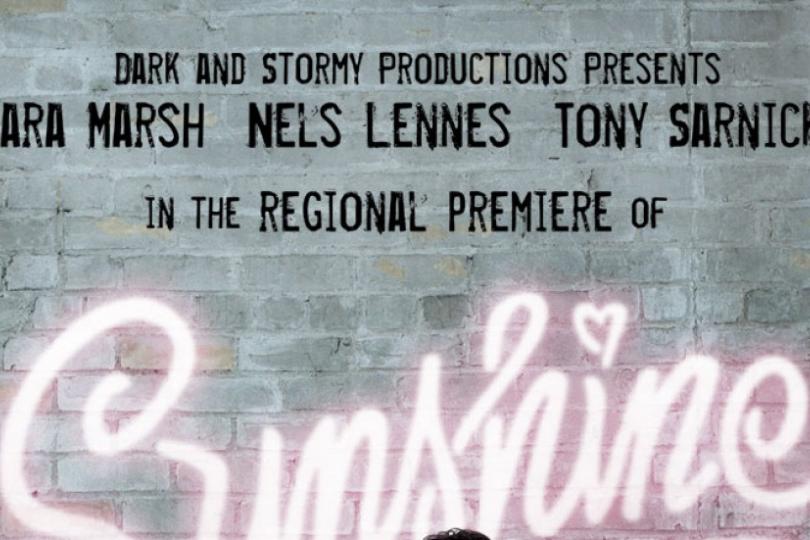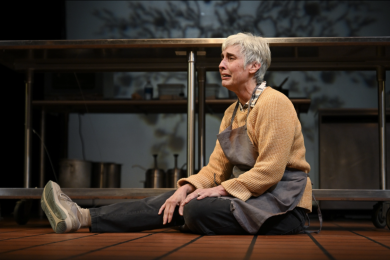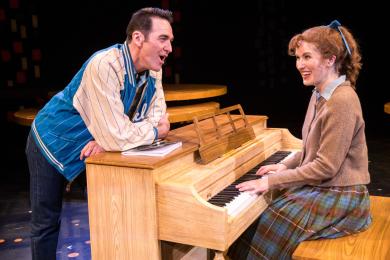Sunshine in 2016

The 90’s were a good decade for sex workers in pop culture. Pretty Woman came out in 1990, followed by Showgirls (1995), Striptease (1996), and even The Full Monty (1997). Whether this was a backlash from Catharine McKinnon and Andrea Dworkin’s anti-pornography work in the 1980s, or simply because movie-going audiences were starting to tolerate more and more adult content, studios were clearly eager to depict and humanize sex work. (Coincidentally or not, 1990 was also the year the MPAA changed the X rating to NC-17.)
It was in this context that William Mastrosimone wrote Sunshine, a play about a sex worker with a heart of gold who makes an unlikely connection with an (also golden-hearted) paramedic when fleeing her abusive husband. Written in 1989, staged in New York in 1991, and set in 1995, the play is a child of a time when people worried about tying up the land line and destroyed their photos by exposing the film.
Twenty years later, a character like Sunshine might not be working in a dollar-a-minute booth; she might be at home with a webcam and a Paypal account. Her transactions would be mediated through a glass screen, not a glass wall, but the play’s message might actually be the same: people are yearning to make connections, and even if those connections are pure fantasy, they’ll take what they can get.
This is all to say that Dark & Stormy’s production of Sunshine feels terribly out of date, but not, as some other reviewers have suggested, because of modern technology. After all, just about every play written before 2005 would be vastly different with smart phones, and we aren’t listing that as a grievance after a production of Shakespeare or Beckett (“Waiting for Godot? Have you tried texting him yet?”).
Rather, I think it feels dated because its protagonist, the intelligent and kind-hearted Sunshine, is one we’ve now seen many times before. If you’ve seen Pretty Woman – and who hasn’t? – you know the narrative of redemption and possible escape from the world of sex work. The job is hard and often dehumanizing, but all a good girl like Sunshine really needs is a glimpse of genuine affection to propel herself into a brighter future. Right?
Predictable but watch out
But despite the play’s predictable plot line, Dark & Stormy has done an amazing job with this production. Actually, this is how I know they’re a company to watch out for – I have no idea why they chose this play, but I would still recommend that you go see it. Their sense of self-assurance, particularly as such a young company, pervades all of their artistic choices. They are confident without being brash, and their confidence is justified by three all-round excellent performances in a tight 90-minute show.
One example of the company’s assuredness is in the way Lizzy Hallas, the set designer, uses the windows of the Grain Belt warehouse building as part of the set. The visible streetlights and the view over Minneapolis spill into Nelson’s apartment, as they would in an actual urban apartment. It’s a small touch, but it creates an instant sense of realism.
All three cast members also make bold choices. For Sara Marsh, as the titular Sunshine, it is in her unwavering Rhode Island accent and her ability to move quickly between states of being in a way that feels true to her character: from nervous activity to confident mind-games to moments of true vulnerability, Sunshine never slips out of Marsh’s grasp. As Nelson, the paramedic, Nels Lennes delivers a totally compelling performance as an everyman.
I expected to have to suspend my disbelief as Nelson finally allows Sunshine into his apartment, but his curmudgeonly acceptance of her presence feels absolutely believable. Lennes has a background in improv comedy, and I suspect that this effectively helped him modulate between his character’s usual deadpan style and his more vulnerable moments. Finally, Tony Sarnicki takes a surprising turn as Robby, one of Sunshine’s clients. He does a lot with a very small chunk of script, as his character moves from the initial naivety of a young college student to the boiling rage of a spurned and obsessive lover.
Unexpected emotional labor
Due to a combination of the company’s strong choices and Mastrosimone’s well-written script, the play shows us some new sides to an old story. One thing it does particularly well is in the way it highlights the emotional labor behind both sex work and emergency medicine. Sunshine works hard to be a chameleon for the men she encounters in her booth, and Nelson struggles with the life-and-death moments he is expected to process quickly and move on from. These psychological ambiguities add a welcome level of nuance to two professions generally seen as more physical than emotional.
Marsh, Lennes, and Sarnicki provide powerfully-acted portraits of three complex characters. Ultimately, though, the play’s redemption narrative still feels straight out of the 90s. We know more now about the wide range of psychological and structural factors that shape lives in sex work and women’s choices about whether or not to stay in the profession. And there are more contemporary alternatives out there, although maybe not enough of them – Katori Hall’s Pussy Valley comes to mind. Dark & Stormy is a company to watch, but we’re ready for a new story.




